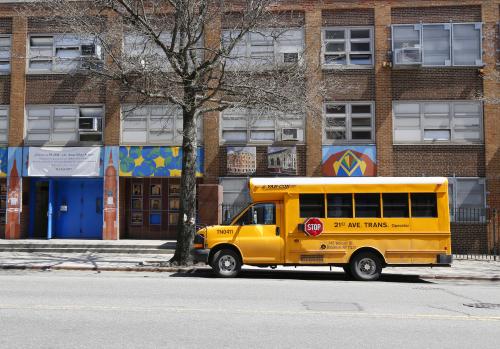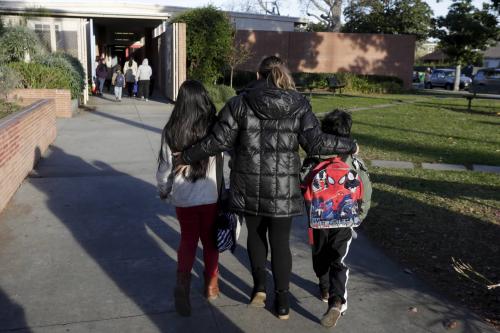How can colleges and tech companies advance opportunities for black collegians to succeed in tech and business? That was the primary question posed to a group of esteemed experts at an event on Friday, May 4 at The Brookings Institution.
Hosted by the Metropolitan Policy Program (Metro), opening remarks from Andre Perry, David M. Rubenstein Fellow at Brookings, and Rodney Sampson, nonresident senior fellow at Brookings and Chairman and CEO of The Opportunity Hub, set the tone for two panels of lively conversation around opportunities for black students in the tech space, as well as how HBCUs can be a catalyst for black students’ entrepreneurial success. Mark Muro, Senior Fellow and Policy Director for Metro, also presented new research related to the opportunities and challenges present for black Americans in the digital economy, and Nicol Turner-Lee, Fellow for Governance Studies, discussed salient points on how the skills gap can be closed in her concluding remarks.
Mark Muro’s presentation highlighted the balancing act of technology’s rapid shifts: how it empowers people, while it is also polarizes. Pointing to recent findings on the digitalization of the American workforce, Muro presented research showing that blacks have greatly increased their presence in computer and math jobs, but their presence in the tech sector remains insufficient overall.
The first of two panels centered around fostering an entrepreneurial ecosystem for black collegians. As moderator, Rodney Sampson began by asking the panelists how we can foster inclusive entrepreneurship in the startup tech ecosystem amongst black collegians. The panelists strongly advocated for a need to create safe spaces for black people to work without bias, and to increase tech ecosystems where they can thrive. Panelists also said that there needs to be a better pipeline from HBCUs to the tech space to retain black talent within a city. As black entrepreneurship within cities grows, panelists noted that the conversation is starting to change around black talent as an investment, rather than as charity. They called for an increase in documenting and elevating visibility of black entrepreneurs in the tech space.
The second panel, moderated by Andre Perry, began by recognizing that higher education must adapt to the needs of entrepreneurs. The discussion focused on what tech companies are looking for, and whether HBCUs are providing the tools that their students need to succeed in professional life. Some tech companies, such as Google, are consciously making investments to ensure that people in underrepresented communities are developing digital skills. The panelists underscored, however, that we need to go further, indicating that there is a need to not just focus on starting a business, but continuing the support needed to sustain the business over time. Higher education has the opportunity to provide the backing that black entrepreneurs need to succeed in the long run.
In closing remarks, Nicol Turner-Lee highlighted three main areas we need to address to close the current skills gap in schools. First, Turner-Lee described how there needs to be an increase in federal appropriation of money for HBCUs. Second, that the tech sector needs to embrace HBCU graduates. Lastly, that the historic model of the black population maintaining deficits needs to change toward acquiring assets.
This memorable event highlighted how colleges, universities, and the private industry can advance opportunities for black collegians in tech and business. Insightful discussions centered on fostering an entrepreneurial ecosystem for black collegians, and how higher education can innovate to encourage entrepreneurship. The Metro Program looks forward to continuing fruitful discussions on these important topics in future work and events.






Commentary
Why we need to advance opportunities for black collegians in tech and business
May 8, 2018